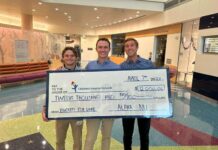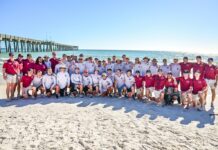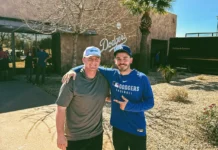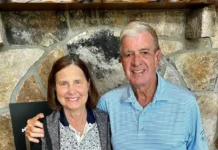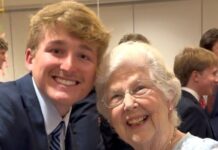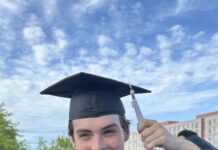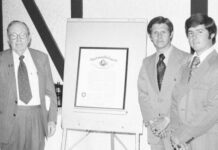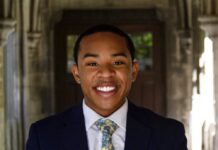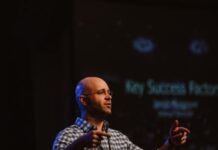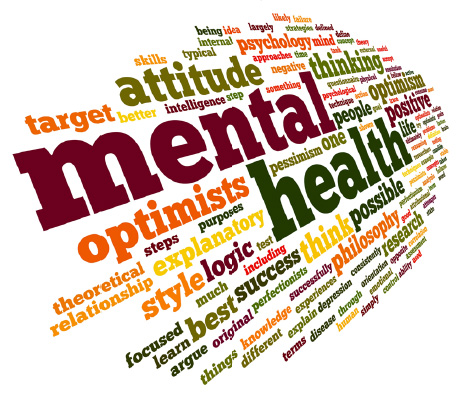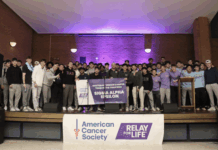When I was asked to write about Kappa Delta Rho’s new mental health initiative known as “Brother’s Keeper” I knew from personal experience, as do many of you, how important this subject is, but I’d be lying if I said I was not nervous about doing the topic justice.
Mental health. Depression. Suicide. These are easy topics to discuss in a generic tone, but not when it counts… When it’s personal. . . when someone we care about is feeling hopeless, despondent, and we don’t know how to break through. Maybe we’re angry at the person for some of their behavior, or don’t know the depths of emotion that person is feeling, or the person is withdrawing, and we don’t know how to break the silence. If you’re an undergraduate in college dealing with this yourself or with a friend, would you know what to do? Where would you go?
According to the American College Health Association’s National College Health Assessment last year, 11.5% of our nation’s undergraduate student population reported having had serious thoughts of suicide.
If we apply that statistic to the KDR population of undergraduate students, it would represent 186 brothers. The ripple effect reaches all the family and friends beyond those 186. This academic year we had two Brothers experience a mental health crisis that we became aware of as an organization. Sadly, we discovered about the one Brother who was having a mental health crisis after he took his own life.
Like many families, mine has been touched. On my Dad’s birthday in 2005, he received a call that rocked our world. My cousin, Eric, had gone outside and pulled the trigger that ended his life. Eric had lived with us for a while and was my older brothers’ age. They were very close friends in addition to cousins. In his early 20s Eric moved to Alaska with his family. With distance they stayed close until for whatever reason Eric withdrew contact. My brothers tried calling his family members to get his phone number but could never get it. Whatever was going on seemed to be a secret. I saw the shock and sadness from our family, but especially for my brothers who struggled with the grief and wishes they or someone could have done something. It was too late. It was too final.
In 2010 I was a freshman in college, away from home, and experiencing the most exciting time of my life to that point. There were so many new friends and great memories being forged. As the year progressed I also
realized that the lifestyle was disastrous for many college students. People struggled with anxieties and being away from home and taking on difficult course loads. Selfmedication through substance abuse was laughed off or
heralded as something to be proud of. At 18 we knew so much yet knew so little.
During finals week in the spring semester of freshman year, a campus-wide email let us know that a student on campus had passed away. Immediately, my stomach sunk. My heart ached for his family, friends, and loved ones.
Christopher Newport University is a fairly small university with only about 5,000 students. At that size, the degree of separation between students is minimal. Over the next few days I started to learn more about Nick from
those who knew him. He was a member of the Catholic Campus Ministry, loved Hawaiian shirts, and was a beloved brother of Kappa Delta Rho. I was not only sad that our campus lost him but was also so worried because his story reminded me of the potential outcomes from so many
others on campus.
At the time Nick passed, I was not a Brother of Kappa Delta Rho, only a fellow classmate. However, Spencer Stanfield, a Brother from my chapter and a member of the KDR Foundation’s Board of Trustees was an active Brother with Nick and recently he shared his recollection with me.
“It started as any other day would. Final exams of the spring semester were starting to kick off, and per usual, I was generally unprepared. I remember waking up late, tripping over clothes on the floor, and stumbling to the shower. I remember grabbing my essay booklet and
darting out the door. What I remember above all, though, was the phone call I received somewhere between my dormitory and the building where my exam was taking place.
I was jogging in the few minutes I had left before the exam start time when I felt the buzz.
“Hey—uh—look—I don’t know if you’ve heard anything, but Nick shot himself early this morning. I’m calling who I can. We’re in emergency protocol now. No brothers are to speak to any media if asked. If you cross paths with any other brothers, make sure they know.”
I managed to hold the phone to my ear as everything went silent. Words wouldn’t come out of my mouth; I couldn’t hear anything. The world seemed to stop. I can’t tell you how that conversation ended. I can’t tell you how I did on that exam. There are very few specific details after that point I do remember.
Nick Smith was a year ahead of me in school and joined Kappa Delta Rho long before I did. In becoming acquainted during my first year in the chapter, I had come to know him as the wise, quiet kid. He was active in Catholic Campus Ministries, a respectable endeavor, and one I found rare
among fraternity men. He was part of a weekly prayer group. He enjoyed studying psychology, even presenting research at a local conference. He was a gifted singer and stage actor. He was a modern-day Renaissance man–what the rest of us strived to be. I watched him from a distance
for the short months I knew him, in awe of his knowledge, wishing I could get closer and learn more from him. I was going to miss that opportunity. We all were.
My memory comes-to at the chapter house, hours later. “He’s still alive, barely. His family is there. They said we can come wait with them if we want to.”
Off we went. Forty members piled into cars and drove to the nearby hospital, where we crammed into a waiting room.
The family gathered there came to us. I don’t remember the exact words; it wouldn’t surprise me if I had chosen not to remember them. All that mattered was that Nick was non-responsive, and he wasn’t going to survive the night. They graciously offered a moment for anyone who wanted to see him in his hospital bed, to say their final goodbyes, asking that we go by ourselves or in small groups to not crowd the room. Their compassion and strength during this time cannot be overstated; it is one of the few details of the day I hope to never forget.
My pledge class of five misfits was a very close one. We stood in a circle in the waiting room, together, arms around each other. We were openly weeping. Grown men, broken down. The hardest hit among us was Ian, for a multitude of reasons: he was Nick’s best friend, his fraternal little
brother, his roommate, and the person who found him that
morning.
Our class left the decision up to him. If he wanted to go, we’d go with him. If he didn’t, we’d stay with him. He decided he wanted the opportunity to say goodbye.
I remember each step toward the room feeling like I had cinderblock shoes. Dragging, one by one, down an ever increasing length of fluorescent white hallway the likes of which you see only in horror cinema, toward a scene I wasn’t prepared for. As we stepped inside, I saw an image forever burned into my psyche. Nick was upright in his bed, eyes closed, and pale. He had dark circles under his eyes, and bandages wrapped around most of his head. This would be the last time I saw him, the last time any of us would.”
A Changed Kappa Delta Rho Brotherhood
When I joined the Beta Gamma chapter of KDR in spring of 2012, almost a year after Nick’s passing, it was evident that losing him still weighed heavily on the chapter. I remember in one of our first chapter meetings, leadership wanted to plan a fundraiser to plant a special tree on campus in memory of Nick. Before they could even discuss their plans, each of my pledge Brothers hands shot up and offered to donate for a Brother they had never met. At the time, it simply felt like the right thing to do. In retrospect, I can see we were helping our Brothers with their losses and
building a support system our chapter needed.
Over the next few semesters, our chapter made it a priority to promote mental health and wellness on campus and with one another. No longer did we expect one another to be overtly masculine and push emotions and feelings inside. We encouraged Brothers who were struggling to come forward and never let potential red flags go unchecked. We had Brothers that became involved in mental health organizations on and off campus
either in search of answers for themselves or to support others. We weren’t experts, we didn’t know what we were doing, but we knew that we had to do everything possible to prevent any future tragedy.
The reason I share our story is because unfortunately it is not that unique. It is shared to encourage other chapters to prevent further heartaches and help themselves and their brothers journey through college safely. As a Brotherhood we have experienced on average the loss of an undergraduate Brother each year for the past 11 years.
The Mental Health Component of “Brother’s Keeper” to provide support for Undergraduates
The National Office of KDR has worked this year with the JED Foundation (JED) and its CEO and fellow KDR Brother John MacPhee, Nu Alpha ’89, to develop the Brother’s Keeper program. This initiative is designed to
help Brothers support one another and to help Brothers struggling with mental health issues.
JED is a phenomenal nonprofit organization founded in 2000 by Donna and Phil Satow after they lost their youngest son, Jed, to suicide. The foundation works with high school and college campuses to improve community awareness, understanding, and action around mental
illnesses. They know that today’s students are facing complex challenges such as alcohol or drug addiction or being in an environment ripe for poor behavioral choices.
As of today, JED is partnered with 200 schools in their JED Campus Program which uses a comprehensive approach to promote emotional well-being and prevent suicide and serious substance abuse. Beyond JED Campus, they also work with over 1700 schools to be a partner with their Ulifeline program, a free service where students can find resources pertaining to mental health at or near their local campus. Kappa Delta Rho will have one by the opening of the new 2018-2019 academic year.
Additionally, they have created partnerships with organizations like Facebook, Instagram, HBO, MTV, the NFL, and the NBA, increasing awareness of mental health needs and providing guidance for identifying mental health crises.
Currently, JED is collaborating and advising with the development of the Brothers Keeper curriculum that is under development which will be included in the Legion educational program.. Their goal is to provide new
members with tools to understand the mental health spectrum, learn coping skills, and give them the ability to approach a friend who might need help. Furthermore, there will be increased emphasis put in the educational programming at Consul’s Academy and Leadership
Academy to educate student leaders on the issues of mental health and how to be a supportive leader to brothers dealing with mental health concerns.
If any good can come from what my chapter experienced, it is that we can serve as encouragement for other chapters to educate their Brothers on mental health. Learn the warning signs in others. Look to the National Office and JED for help. You do not want to end up having to make changes or learning how to cope after it is already too late.
For those who know Brothers that may be struggling, reach out. Take that first step. Be willing to have the tough conversations and encourage them to seek help. You’ll be glad you did.
And for those who are currently struggling, do not be afraid to ask for help. You are not fighting this battle alone. If needed, you can get immediate help from the National Suicide Prevention Lifeline by texting “Start” to 741-741 or by calling 1-800-273-8255. If you would like to get involved or learn more about JED you can visit them online at: www.jedfoundation.org.
Editor’s Note:
We set out in writing this article to not only inform our membership of the upcoming Brother’s Keeper program, but also to tell the story of the Christopher Newport University chapter and how a Mental Health Crisis impacted them. In telling that story, we reflected on the impact our Brother, Nick Smith, Beta Gamma ’12 had on our lives. It contains details that may be hard for some to read, but we believe it tells the story we wanted to share. While this article focuses on his death, it is more important to focus on his life. Nick was a resident of Charlottesville, VA and a student at Christopher Newport University. He was active in multiple youth ministries and hosted his own Wednesday night prayer group. He was a devoted student of psychology who presented research on human sleep patterns and their impact on cognition and behavior. He was a talented singer. He was a former wrestler. He was a devoted Brother who had love for everyone in the chapter. Because of the awesome life he lived in such a short time, this is the way we choose to remember him. It’s what he would have wanted. Thank you for taking the time to learn his story.

